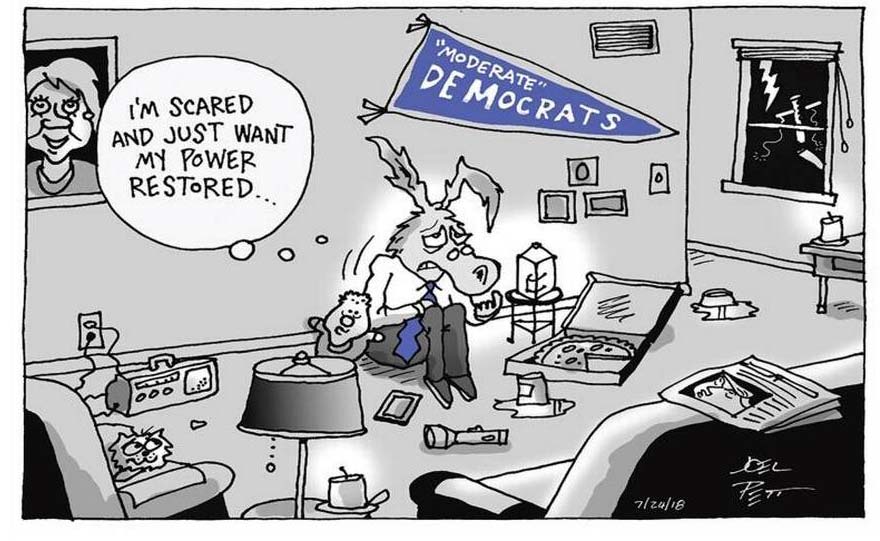
On the first night, both Beto O'Rourke and Sen. Amy Klobuchar, D-Minn., will be on the stage with Warren; on the second night, former vice president Joe Biden, plus two Colorado pragmatists (former governor John Hickenlooper and Sen. Michael Bennet), will have an opportunity to make the case for "not socialism."
While I do not expect Biden to directly challenge Sanders (although he might tout his experience as evidence that deal-makers are generally closer to the middle than the extremes of their party), Hickenlooper and Bennet have a shot, maybe their only shot, to make an impression by warning Democrats away from embracing socialism.
There are lots of ways to go about doing that. There's the electability argument. Third Way, a moderate Democratic group that Sanders has attacked, found in a recent survey:
By a 63-32% margin, Democratic primary voters want the candidate with the best shot at beating [President Donald] Trump over one who matches their policy preferences. This sentiment is held by 65% of African Americans, 64% of whites, and 62% of Latinx voters.
Sixty-seven percent of Democratic primary voters say a candidate needs to unite a broad range of voters, including some who voted for Trump the first time around, to win-compared to 25% who say a candidate should move left to generate enthusiasm with progressives and liberals. There is support for this approach across intra-party ideological lines; 72% of moderates believe Democrats need a broad coalition, as do 65% of liberals.
Another way to debunk the substance of "free stuff" policies is to show that they unfairly aid wealthier Americans (e.g. wiping out college debt for rich and poor alike is a bizarre transfer of wealth from most Americans, who do not attend college, to higher-earners who do).
In a CNN town hall in February, Klobuchar firmly rebuffed free college plans. "I wish - if I was a magic genie and could give that to everyone and we could afford it, I would," she said. "I'm just trying to find a mix of incentives and make sure kids that are in need - that's why I talked about expanding Pell Grants - can go to college and be able to afford it and make sure that people that can't afford it are able to pay." That's exactly what she has to say in response to Warren's "free college" (and other free things) plan.
Warren, for example, has never been directly challenged on the amount of revenue a "wealth tax" would generate, or on the cost of her plans. If rich people squirrel away their money offshore (or by other means), then how does Warren pay for her long list of programs?
Policies that blithely take away personal control and choice - Medicare-for-all that prohibits you from keeping your existing private plans - are also ripe for skewering. O'Rourke has sternly resisted calls for Medicare-for-all; now is his chance to engage with Warren on the topic.
Moreover, rather than warmed-over socialism from the 1960s (or 1930s), moderate candidates can set out a pro-growth policy that decreases income inequality. Capitalism is unparalleled in its ability to generate wealth and innovation, but it must be tempered with an adequate safety net and substantial investment in those who don't have the benefit of generational wealth.
"This is the project of the rest of my life, I think election after election after election after election to establish a set of policies that drives broad economic growth in this country, lifts incomes for everybody in America again, educates our children, builds a durable solution to climate change that can't be torn out every two years depending on what happens in the congressional elections, creates universal health care in America," Bennet said in a public radio interview. "We're the only industrialized country in the world that doesn't have that."
And finally, there are the pragmatic political arguments against these pie-in-the-sky plans. Even if Democrats win the Senate (a big "if") and even if they abolish the filibuster (another big "if"), there likely is not a majority in the Senate to support grandiose schemes.
So why spend time beating one's head against the wall when there is the potential for meaningful changes that help individuals at risk now (e.g. a public option to expand health coverage)? If the moderators don't ask Sanders and Warren what they would do if their schemes don't get support, Klobuchar, Bennet or Hickenlooper should pose the question: What's the backup plan?
Capable moderates (e.g., Klobuchar, O'Rourke, Hickenlooper, Bennet) presently stand on the periphery of the race. Maybe the only way they can make a splash is to show that socialism is a weight that Trump cannot tie around their necks. Making a case that their plans actually might command an electoral majority and deliver promised benefits might be the key to one of these candidates breaking out.
By adopting the "I'm going to be honest with you when others won't" stance, they can grab the opening to become truth-tellers in describing how many of the goals (e.g. universal coverage) proposed by the uber-progressives can be attained by other means.
After all, what do these contenders have to lose?
Sign up for the daily JWR update. It's free. Just click here.
(COMMENT, BELOW)


 Contact The Editor
Contact The Editor
 Articles By This Author
Articles By This Author